One of the best ways to make more money as a freelance writer is to offer different types of writing services.
Learning how to write a white paper is a great way to take your business to the next level.
This is a type of marketing tool that businesses use and it can help you make a living as a writer.

But, writing a white paper isn’t the same as a blog post or even writing an eBook.
It’s also not a case study or journal article.
What is a white paper, and how do you write one?
If you’re a new freelance writer, I want to help you start on the path of success and white paper writing can take you there.
In this post, I’ll share with you what a white paper is, how to write a white paper, give examples, offer a white paper template and more!
And just so you know, you don’t need to have experience in writing white papers to declare this as a new freelance writing service!
Many of my course students are presented with this project after writing for a client, and it has opened the doors to new high-paying projects.
But, it’s always nice to get some help on this new type of writing!
What is a White Paper?
The white paper definition is an official report – or government report – which shares the company’s message and informs their potential customers about a complicated issue in an easy-to-read, but highly formal format.
When looking at this definition, you can see that a white paper presents an issue or problem to help the reader understand the issue, and shares a solution to help readers make a decision.
So, a white paper is to inform and educate.
This can be viewed as similar to writing a simple blog post. In a blog post, you are presented with an issue or problem, and the blog post walks you through a solution to help you make a decision.
But, there are critical differences to writing a blog post and writing a white paper:
- A blog post is highly conversational; a white paper is highly formal (think like a mashup of a magazine article and a brochure)
- A blog post is generally short in length; a white paper is usually longer than a typical 800-word blog post
- A blog post doesn’t have to include highly credible sources; you may need to cite a white paper
The purpose of a white paper is also different than a blog post –
A white paper is a lead generation tactic to help businesses gain leads.
What this means is that it helps businesses with improving their conversion rates, closing rates and qualification rates.
They are usually offered as a lead magnet – a free incentive – and marketed on their company site on landing pages.
An important distinction between white papers and other lead magnet guides is that a white paper is data driven and is researched-based. This makes them highly credible, and highly optimized for conversions.
The trick for a freelance writer is to present this research-based report into a magazine-style package that we call a white paper.
And when businesses have optimized white papers, they show and establish their authority in their industry. As a writer, you can help them achieve that, making you a highly valuable resource on their team.
This translates into more money as a freelance writer.
White paper rates vary from as little as $2,500 to upwards of $10,000 for a 5-18 page white paper.
In fact, some freelance writers are making $300k a year writing white papers.
It can even be more profitable than ghostwriting.
So, it’s in YOUR best interest to know what a white paper is and learn how to write a white paper!
To help you understand more about writing a white paper, let’s look at some examples.

White Paper Examples (+ The Most Successful White Paper Example)
Big companies often use white papers to inform and educate their customers or huge brand customers about their platform and products. This is to help other brands become familiar with a company’s product.
For example, Google’s white paper covers the Google Cloud platform products and security policies.
It has a table of contents and is presented online or can be downloaded as a PDF.
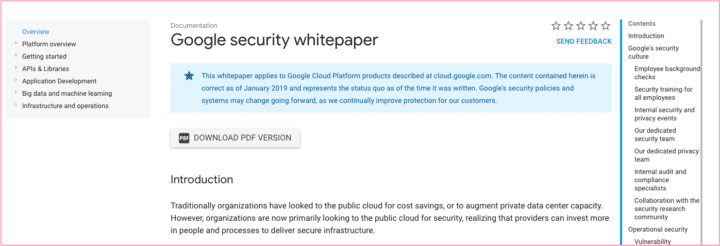
Another white paper example is from Hyperledger. They are a blockchain technology company, and their white paper discusses blockchain terminology and performance metrics.

In the health niche, Labiotech has a white paper on the human microbiome. In this white paper, they want to shed a new explanation on health and disease from a microbiome perspective.
As you can see, they are using this white paper as a lead magnet to gain subscribers to their email list.
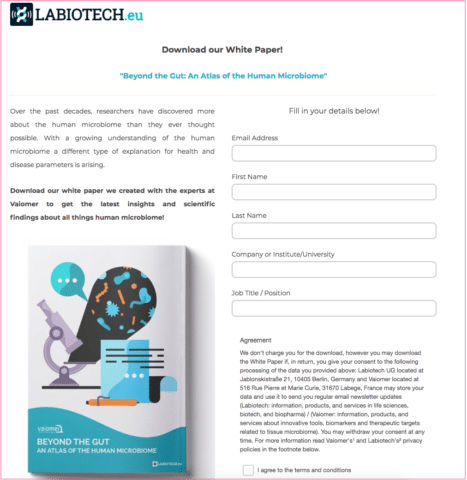
Officemorph’s white paper reads more like a magazine article but is presented in a formal manner. The audience is also different than for an office supply magazine.
This white paper’s audience is office managers and executives.

As you can see, each white paper example is different in the context and type of audience.
And, what’s the most successful white paper that has ever been written?
The Bitcoin white paper by Satoshi Nakamoto (pseudonym)! This helped start the cryptocurrency industry get off the ground.
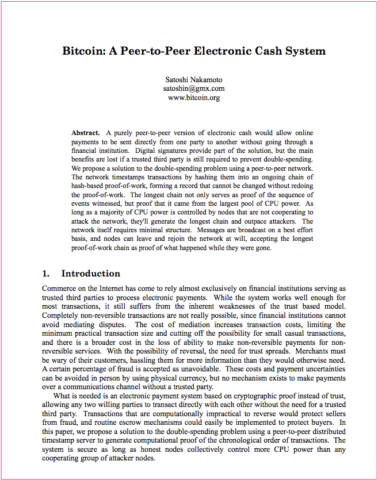
Types of White Papers
There are several types of white papers a freelance writer can write. The most common types are:
- Overview – This is a product-based white paper that showcases the features and benefits of the product. This type of white paper highlights a product and helps educate a customer on how to use this product.
- Comparison – This white paper compares products to help a customer decide which is the best option for them. These types of white papers are usually promoted towards the end of a sales cycle, when a potential customer is already interested in a product but doesn’t know which one.
- List – This type of white paper is the most similar to a blog post or article. A list white paper gives a reader tips or examples in a list format, making it an easy read.
- Solution-Based – This presents a problem in the company’s industry, current solutions that aren’t working and offers a new solution or approach that works better than any of the other solutions mentioned in the white paper.
White Paper Template
Here is a simple white paper template that you can use to start writing a white paper for your freelance writing job. There are two parts of this white paper format.
The first part is what to include at the beginning of your white paper, and the second part mentions more about the way you structure a white paper and how to end your white paper.
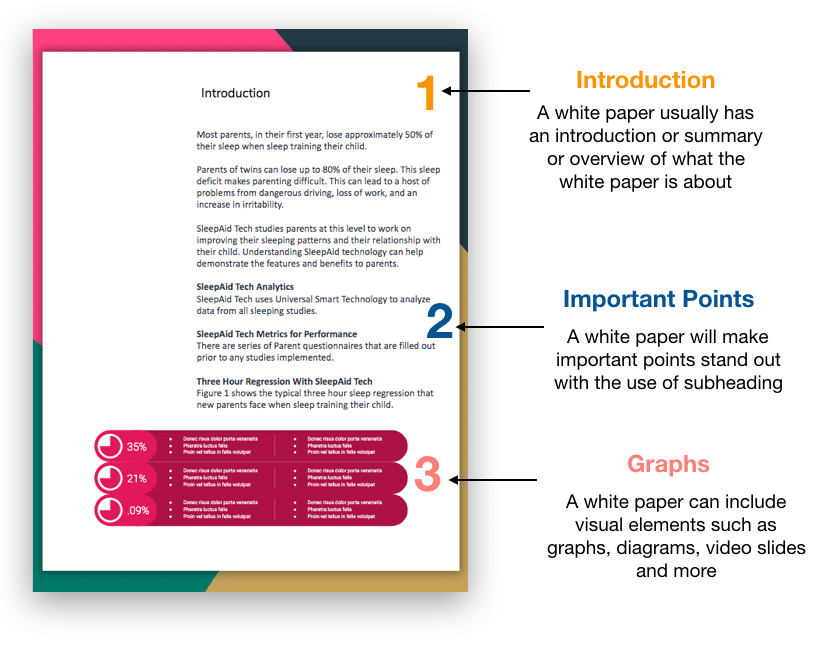
1. Table of Contents/Introduction
Lengthy white papers make use of a table of contents. I didn’t include this in my mockup template, but it might be a good idea to add if your white paper is long.
The introduction can be a summary of the entire white paper or an introduction to the problem or product mentioned. For the mockup white paper example, I used a fictional SleepAid Tech company, and the paper demonstrates their products and the features and benefits of each product.
2. Important Points
In my introduction, I specify the problem and what the company’s products do to help alleviate this problem.
I then make important points by using subheadings to emphasize that performance, analytics, and a three-hour sleep regression are essential to understanding the product.
3. Graphs
When you write a white paper, you can use visual elements such as graphs, diagrams, and even video slides (if the white paper is a slide presentation).
For this fictional white paper template, I used a diagram to show the results of the sleep regression study.
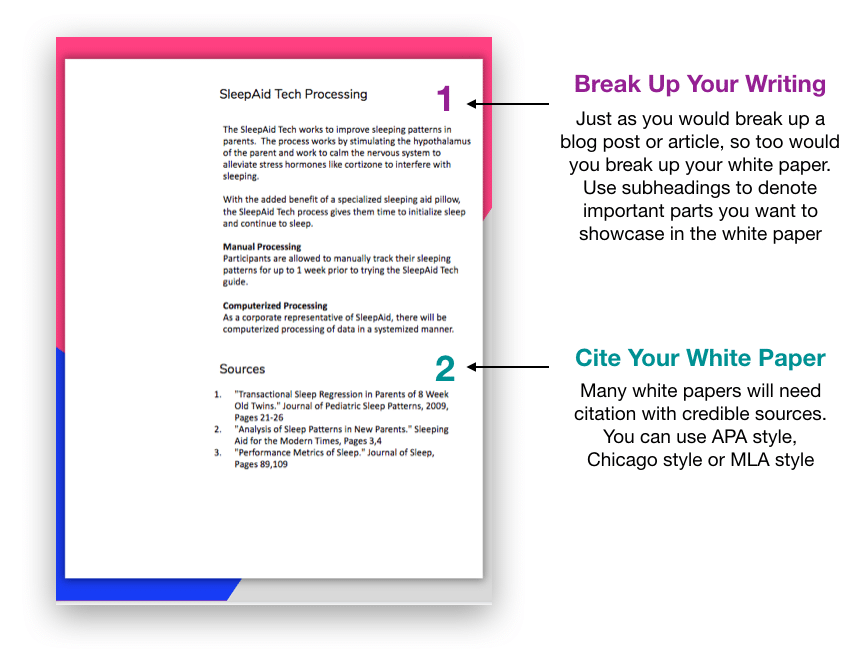
4. Break Up Your Writing
Just like any other type of content, you might write for a client, space out your writing, and break it up with subheadings and visuals.
Some white papers are double columned to break up the writing, but in general, use subheadings to note important topics in your white paper.
5. How to Cite a White Paper
You can end your white paper in many ways –
- Conclusion paragraph
- About company paragraph
- Resources
- References
Some white papers will need you to cite your sources. There are three styles to citing your white paper – APA style, Chicago style, and MLA style.
Make sure to ask your freelance writing client which citing they want for their paper and if they wish to have in-text citation as well.
Here are three videos that walk you through citing your white paper.
How to Cite a White Paper Using APA Style
How to Cite a White Paper Using MLA Style
How to Cite a White Paper Using Chicago Style
Free Citation Generator
You can use free citation generator tools to cite your sources quickly whether they are books or websites. Here are three free citation generator tools.
How to Write a White Paper
The steps to writing a white paper are similar to writing a blog post or article. You have to research your topic from credible sources and use formal writing to write your post, ensuring that you are speaking in the appropriate language for your client.
Finally, you need to add the elements to ending your white paper. So, let’s dig deeper and talk about the way to write a white paper.
1. Where to Write Your White Paper
There are generally two places you can write your white paper – Microsoft Word or Google Docs.
I prefer Microsoft Word, but if your freelance writing client wants you to use a template, then Google Docs has several templates you can use. Or, if you prefer, Venngage has some beautiful white paper templates you can use for free.
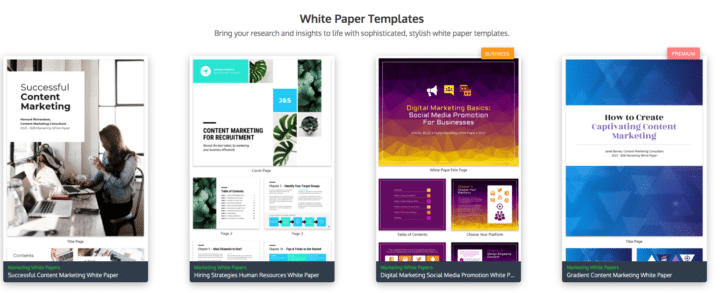
I would also ask the client if they specify APA, MLA, or Chicago style of writing or just to use for the reference section of the white paper (if needed).
Again, each white paper you write will have a different theme and purpose.
2. Topic Generation
Many clients will already have an idea of what they need. For example, a client I had when I first started wanted a white paper on hiring mistakes with the emphasis placed on proper employment background checks.
If a client doesn’t provide a topic, I encourage you to sit down with the client on Skype or via phone to discuss what their reason is for wanting a white paper vs. a case study or some other lead magnet and work around the problems their customers have.
This can drum up some ideas that you can work around.
As well, use Google to search for topics to help out your client. Make sure not to pick topics that are too large and require in-depth analysis or topics that don’t need a lot of explanation to provide.
3. Research Credible Sources
To find credible sources for your white paper, you need to look at trusted sites like Government sites (Bureau of Labor Statistics).
Using Journal articles, reference books, or publications are also great ways to find sources. Sometimes you will have to look locally for sources if your white paper is about a city policy or city problem.
4. Formal Writing Tone
White paper writing is formal and less conversational than a blog post. To practice writing in this formal tone, read up on research journal articles and white papers to get a feel of the style of writing needed.
I would also get the help of other freelance writers to review your white paper to see if the style of your writing is easy enough to understand and read, but informational and gets the point across.
As I mentioned, a white paper is a mashup of a magazine article and brochure. So, finding that balance of ease of reading and formally discussing your topics is key.
5. White Paper Format
As a freelance writer it isn’t your job to format the white paper in terms of white paper cover design.
But, this can be a service you offer to increase your value as a writer.
You can use tools like Canva, PicMonkey or Photoshop to design your white paper cover.
How to Market White Papers to Businesses
B2B and B2C businesses can benefit from white papers. But, many businesses may overlook the need for a white paper or not even know what a white paper is as a way to improve their conversion rates.
It’s up to the freelance writer to market white paper writing as a valuable asset to businesses. But, how do you convince potential clients that you are the white paper writer for them?
1. Mention Statistics on Your Services Page
It’s a good idea to use statistics on your service page or writer website copy to help show the value white papers have. This means educating a potential client on this new type of content.
A metric business sites use to see how their business is performing is the website conversion rate. They want to know how many visitors that land on their website convert into a buyer.
For example, the average conversion rates on websites for the B2B industry is 2.23%. White papers can help increase the conversion rates for businesses.
And the best nurturing tactics is providing valuable content, and a white paper can provide that. It can help a potential customer through the buyer’s journey through targeted content.
2. Build a White Paper Portfolio
The proof is in the pudding, right?
Make sure your portfolio page has white paper samples. They can be mock-ups or client pieces. Simply showing proof that you can write a white paper is enough for a potential client to hire you.
3. Niche Down to White Paper Writing
To stand out and get the best conversions for your business, niche down to white paper writing. For example, freelance writer Wilton Blake is niched down for writing white papers and case studies.

By improving the copy on your writer website and showing samples of your service, you can have a highly optimized writer website.
And, if you need help creating that type of writer website, make sure to check out Writer Website in a Weekend.
White Paper Resource
If you need a breakdown on the exact steps on how to write a white paper, make sure to check out the White Paper for Dummies book! It’s from the expert white paper guy Gordon Graham.
Definitive Guide on How to Write a White Paper as a Freelance Writer
There you go!
A simple guide to writing your first white paper as a freelance writer. I hope this was helpful! I know my other blog post on how to create a cover letter helped a freelance writer gain a client!
For more writing help, check out these guides:
- How to Write a Letter of Introduction
- How to Write a Case Study
- How to Write a Resume for a Job
- How to Write a Cover Letter
- How to Write an Email as a Copywriter
Share in the comments if you write white papers or if you’re interested to add this to your services!
And please remember to pin me!





44 Comments